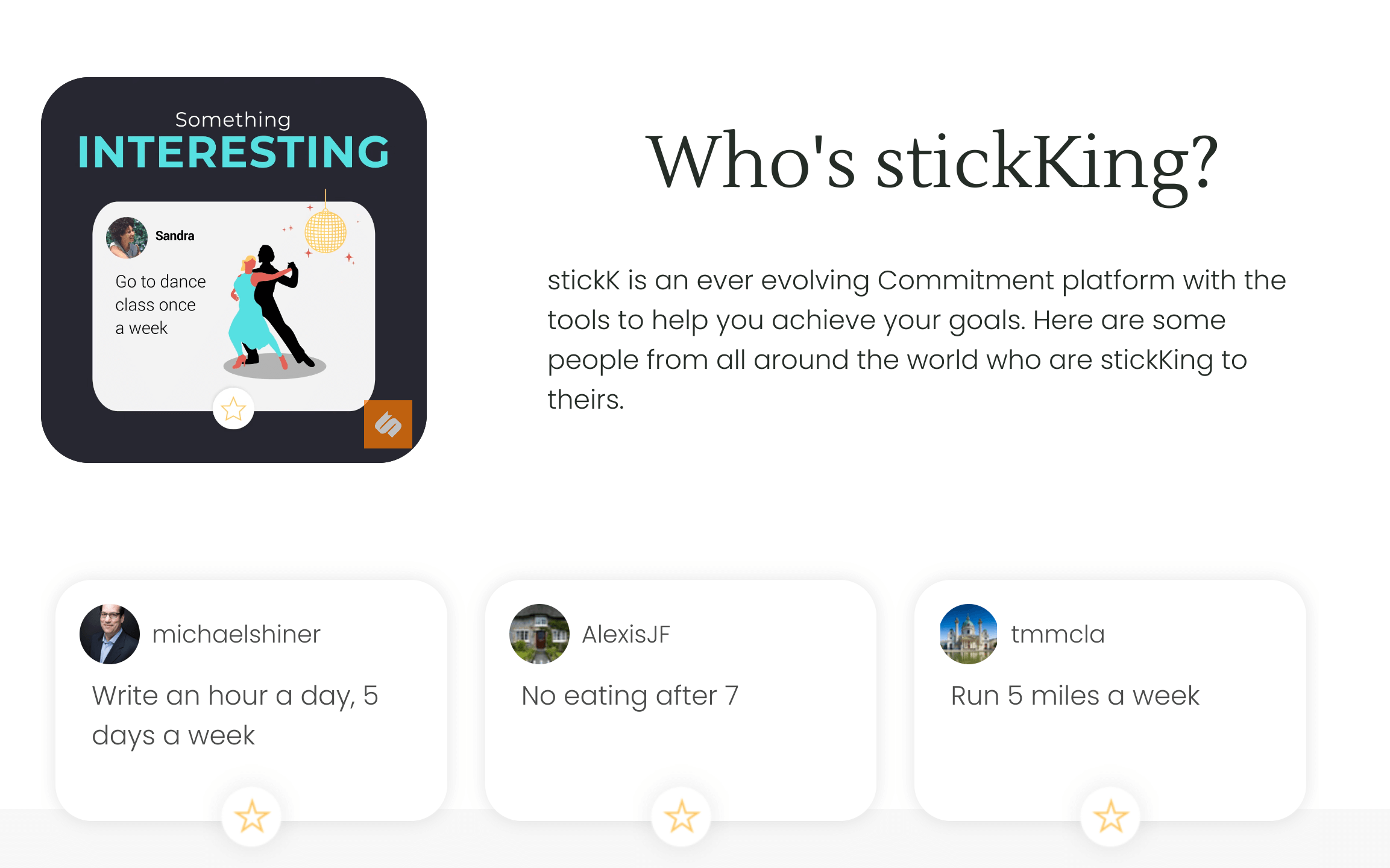Try a commitment device to help you get work done
Your current self plans, but your future self doesn't want to execute the plan. Lock yourself into following through, using a commitment device.
Have you ever sat down and counted the number of New Year's resolutions you've made in your lifetime? Try a rather bleak exercise – sort them into two categories: "fulfilled" and "abandoned".
If you're anything like most of us, the abandoned list is much, much longer.
This exercise is not to embarrass you but to highlight that everyone has trouble meeting their goals, especially those that require a long-term commitment. Why does this happen? To put it simply, it's an indication of a mismatch between your "present" self and your "future" self. When we think of a milestone we want to reach, our present self is ambitious, focused, motivated, and has the best of intentions. But it's our future selves that have to take the action necessary to achieve what we've set out to do. This means there's room for an intention-action gap to emerge.
This gap is born out of either a complete lack of willpower to turn intention into action, or the old devil akrasia – procrastination – that seems to always get in the way of productivity.
One solution to avoid such a scenario could be to adopt a commitment device.
What is a commitment device?
The simple definition and function of a commitment device, according to behavioral scientists, is an action, process, or strategy that locks you into behavioral change, by linking it to a reward or punishment.
Let's talk about the most famous example there is – Odysseus and the Sirens. In Homer's Odyssey, as King Odysseus is returning home from the Trojan War, he finds himself sailing close to the home of the Sirens, half women, half birds, who lure sailors to destruction with sweet songs. To resist the temptation, he has his crew tie him to the ship's mast and plug their own ears with beeswax. That way, he could hear the Sirens' songs without being lured into their trap.

In modern behavioral economics, Odysseus' preemptive measure was a commitment device: he put in place a mechanism that would set him up to behave how he wanted to later, ie., not lose himself to the Sirens.
Odysseus's lesson on commitment devices holds value in real life – in every small or big action you can think of. The right commitment device can ensure you make progress on achieving your goals without losing focus or giving in to temptation.
Effective commitment devices have two important features:
They are voluntarily adopted: Locking down a commitment must be by choice. This means you should be aware of where the intention-action gap lies and consciously choose how to overcome it, rather than just going for a vague commitment process that may or may not help you build the path to progress.
They must come with a cost: Failure to uphold your commitment should have consequences (or perceived costs) you don't want to face, to give you that extra nudge to keep it going.
Do not rely on self control
Whether or not you believe in will power depletion (and the jury is out on whether that's real!), we all intuitively know that it's a bad, bad idea to rely on will power and self-control. Many of us are self-aware enough that we know our self control doesn't stand a chance when the going gets tough.
If your pantry is stocked with junk food, and your fridge is full of ice cream, what are the chances that you'll remember your diet, especially at the end of a long hard day, when your mind is screaming for it? On the other hand, if you bind yourself by simply not buying junk food, the chances are much higher that you'll not succumb in a weak moment. This is the equivalent of tying yourself to the ship's mast. Make it harder for yourself, and add more friction to the process, with commitment devices.
Common commitment devices to adopt
A commitment device can be as soft or rigorous as you like (or need). For a few of us, using a habit tracker app is enough -- it shows you statistics and makes you confront the fact that you've missed going to the gym thrice this week. But if you're reading this, we'll assume you're like the rest of us, and need a lot more than that!
Make a public commitment
"Public" commitment devices are not just about declaring your intentions but rather, taking action in a public way to ensure you complete it.
For instance, if your long-term goals involve skill development, you can sign up for workshops along with other people from work. Knowing that they'll be expecting you to attend with them may be enough to hold you accountable for it.
Making a public commitment means you add a social cost to failure. Everybody you know will witness a public failure and probably laugh at you – so you're incentivized to make sure you don't fail!
Leave yourself no choice
Increase the stakes, with consequences. Tie consequences to failure, so you simply can't afford to fail.
Make a commitment that puts your back to the wall, literally. In ancient China, military general Han Xin once sent his soldiers to battle against an enemy army and positioned them with their backs to the river, leaving them no choice but to fight themselves to safety.

Now, hopefully, you're not fighting any major wars here, but if the stakes are high, make sure your strategy is resolute.
Enter a financial investment / social contract
Putting money down is a great incentive to commit to establishing your commitments, The most common example of this is getting a gym membership: if you can see a certain amount of money leave your bank account for the gym every month, you're likely to make it there at least a few times a week to get your money's worth! If you hire a coach, you'll likely pay more attention to your tasks simply because you'd feel guilty otherwise.
Similarly, you can make social commitments such as signing up with a gym buddy who's relying on you to work out with them.
Give your word
In a situation where you've made a commitment to provide a product or service to someone, make sure there is a contract binding you to it, financial or otherwise. For instance, try to get paid before you deliver the product – that way, you make sure you get the job done or face a loss of trust.
Or, if you want to better yourself at a task or skill, promise to teach someone else how to do it as well, so you both need to get down to it sooner rather than later.
Try temptation bundling
Restricting yourself to temptation does not always pay out, but if you tweak it as a reward for yourself, there's less guilt. The trick of temptation bundling is to add something you enjoy doing as a reward for doing something you don't. It can be as simple as promising yourself, "I can only eat chocolate if I run 10 miles" rather than saying "I will not eat chocolate and I will run 10 miles".
Commitment devices for common goals
Some of the most common goals people make and are unable to achieve can be addressed by introducing some really simple commitment devices. Here are some examples:
If your goal is to sleep and wake up early
Try removing your distraction device, say, your phone from your bedroom and putting it elsewhere so it is harder to get to it.
Try placing your alarm clock at a corner farthest from your bed, so you'll have to get up to shut it off.
If your goal is to focus on nutrition
Sticking to a diet is tricky. Remove will power out of the equation.
Simply remove the temptation: make it a rule to not have unhealthy food or food you're trying to avoid in the house. Why exercise willpower when it's not necessary?
Or, you can buy small packets of snacks and eat in small plates instead of the family size, to control your urge to binge-eat.
If your goal is to exercise/lose weight
Put your money where your mouth is and get a long-term gym membership that automatically takes your subscription fee.
Or, enter a social contract with a workout buddy or a personal trainer to hold you accountable to exercise.
If your goal is to budget or save money
It's an old trick but it works – add an automation so that money is removed from your bank account to be saved regularly, before you're tempted to spend it! And work with a financial accountability partner if possible, of course.
If your goal is to work better or more efficiently
Try to commit to your deadlines publicly by giving your boss or coworkers a definite date by which you will finish the work. Share your progress with them so you know if you slack off, someone will notice.
You can also enlist yourself to work with someone, so you know they're counting on you to do your bit. Create a work session booking on a platform like Focusmate – you'll have to show up, or risk disappointing your partner.
How BaaS helps as a commitment device
If you think getting accountable is what will help you achieve your goals, sign up with Boss as a Service and use us as your accountability and commitment device! Here's why you should do it:
It's a commitment contract
With BaaS, you are committing to set goals and achieve them with accountability to us. It's not just committing to something – it's having someone follow up and ask you if you completed what you promised you would, and to prove it!
You can ask a family member to help you, but why would you, when you can have a professional do it? We're here to track your progress, analyze setbacks and celebrate your wins. Together, we'll keep and track your habits, and maintain a commitment journal.
We have anti-temptation strategies
Whether it's procrastination or a lack of focus hindering progress for you, we have all the advice and tools to help you overcome it. Plus, with our periodic social challenges, we'll help introduce you to a community of like minded goal setters to throw in an element of friendly peer pressure.
We'll make you do your work or pay money!
BaaS works well with financial accountability apps, that let you make a monetary contract, like Beeminder, StickK and Taskratchet, and other apps. The idea behind these apps is that if you don't follow through on your commitments, they charge you – actual real money! Adding this monetary consequence can be a powerful self-binding mechanism.

Stickk also lets you customize how the monetary consequence will work – you can donate the money to a charity, or interestingly, an anti charity – a cause that you don't like. Will the thought of having your money go to a political party you don't agree with, or (heavens forfend) a football club you don't like, make you work harder?
Final Thoughts
If you're struggling to get something done, maybe you need something to bind you. Take the accountability to the next level with a commitment device! You can choose the device to suit the occasion, and it's a potent tool to force yourself to get the task done.